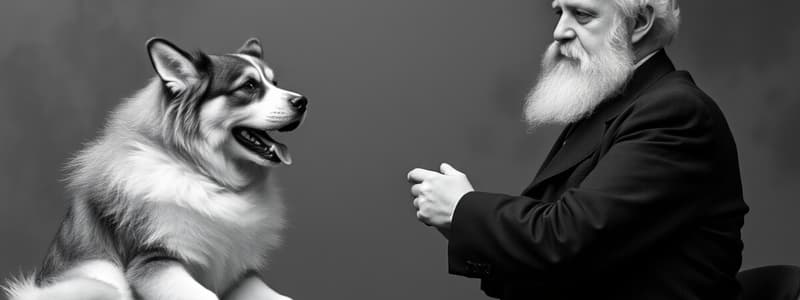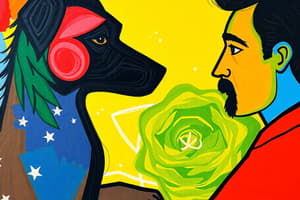Podcast
Questions and Answers
What is classical conditioning?
What is classical conditioning?
Learning in which a response naturally caused by one stimulus comes to be elicited by a different, formerly neutral stimulus.
The classical conditioning formula can be written as: UCS --> _____
The classical conditioning formula can be written as: UCS --> _____
UCR
Who accidentally discovered classical conditioning?
Who accidentally discovered classical conditioning?
Ivan Pavlov
What is an unconditioned stimulus (UCS)?
What is an unconditioned stimulus (UCS)?
What is an unconditioned response (UCR)?
What is an unconditioned response (UCR)?
What does higher order conditioning refer to?
What does higher order conditioning refer to?
Which of the following are key variables of classical conditioning? (Select all that apply)
Which of the following are key variables of classical conditioning? (Select all that apply)
What must stimuli (UCS, NS) have to provoke a response?
What must stimuli (UCS, NS) have to provoke a response?
How must UCS and NS be paired for effective conditioning?
How must UCS and NS be paired for effective conditioning?
Why is frequency important in classical conditioning?
Why is frequency important in classical conditioning?
What is blocking in classical conditioning?
What is blocking in classical conditioning?
What did Kamin's work demonstrate?
What did Kamin's work demonstrate?
What is backward conditioning?
What is backward conditioning?
What does Rescorla's work exemplify?
What does Rescorla's work exemplify?
What happens during extinction in classical conditioning?
What happens during extinction in classical conditioning?
What is spontaneous recovery?
What is spontaneous recovery?
What is generalization in classical conditioning?
What is generalization in classical conditioning?
What is discrimination in classical conditioning?
What is discrimination in classical conditioning?
What is taste aversion?
What is taste aversion?
What is the Garcia effect?
What is the Garcia effect?
What is preparedness in classical conditioning?
What is preparedness in classical conditioning?
What is contrapreparedness?
What is contrapreparedness?
What is systematic desensitization?
What is systematic desensitization?
What is flooding in therapy?
What is flooding in therapy?
Flashcards are hidden until you start studying
Study Notes
Classical Conditioning Overview
- Classical conditioning is a learning process where a natural response to one stimulus is triggered by a previously neutral stimulus.
- Key figures include Ivan Pavlov, who unintentionally discovered this phenomenon through experiments with dogs.
Key Concepts
- The classical conditioning formula consists of three main components:
- Unconditioned Stimulus (UCS) naturally elicits a response (UCR).
- A Neutral Stimulus (NS) paired with UCS leads to a Conditioned Stimulus (CS) that elicits Conditioned Response (CR).
Terminology
- Unconditioned Stimulus (UCS): Esp: food; naturally causes a specific response.
- Unconditioned Response (UCR): Esp: salivation; an automatic, unlearned reaction to UCS.
- Conditioned Stimulus (CS): A previously neutral stimulus that, after association with UCS, evokes a conditioned response.
- Conditioned Response (CR): The learned reaction to the CS.
Advanced Conditioning
- Higher Order Conditioning: A conditioned stimulus can serve as an unconditioned stimulus for further learning (e.g., a light predicting a tone that signals food).
- Factors affecting conditioning include:
- Strength: Stimuli must be noticeable to elicit responses.
- Timing: Optimal pairing of UCS and NS is crucial; NS should precede UCS for best results.
- Frequency: Repeated pairings solidify associations.
Conditioning Effects and Variations
- Blocking: Previous association with UCS can prevent conditioning to a new stimulus if presented simultaneously.
- Backward Conditioning: NS may appear either before or after the UCS but not both; it’s less effective.
- Taste Aversion: A learned aversion after becoming ill from a specific food.
Notable Studies
- Kamin's Work: Demonstrated blocking where rats did not fear a light if it was only associated with a previously conditioned tone and shock.
- Rescorla's Work: Showed the context can influence response; a tone signaling fear or relaxation based on its pairing with shock.
Extinction and Recovery
- Extinction: Occurs when CS is no longer paired with UCS, leading to the CS reverting to a neutral state (e.g., Baby Albert losing fear of fluffy white objects).
- Spontaneous Recovery: The return of a conditioned response after a period of extinction indicates learned behavior has not been entirely erased.
Generalization and Discrimination
- Generalization: Responding similarly to stimuli that are similar to the CS.
- Discrimination: Distinguishing between different stimuli, responding only to specific CS associated with UCS.
Clinical Applications
- Preparedness: Some behaviors are naturally easier to condition based on an organism's instincts.
- Contrapreparedness: Conditioning is hindered when behaviors conflict with natural instincts.
- Systematic Desensitization: Involves a hierarchy of fearful situations and relaxation techniques to gradually reduce fear.
- Flooding: Clients confront their greatest fears to diminish longstanding fears; facing worst-case scenarios often leads to overcoming fear reactions.
Studying That Suits You
Use AI to generate personalized quizzes and flashcards to suit your learning preferences.



